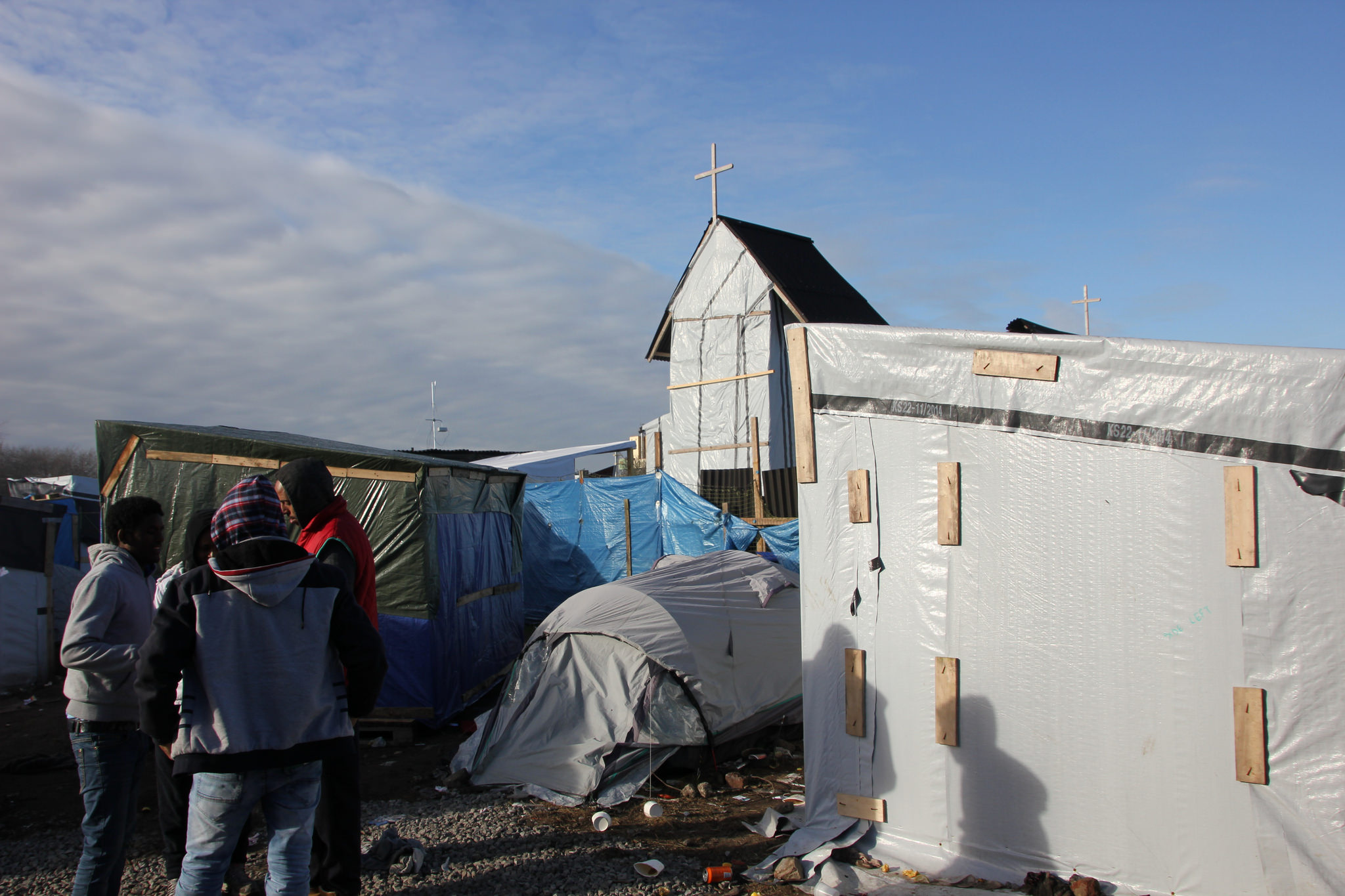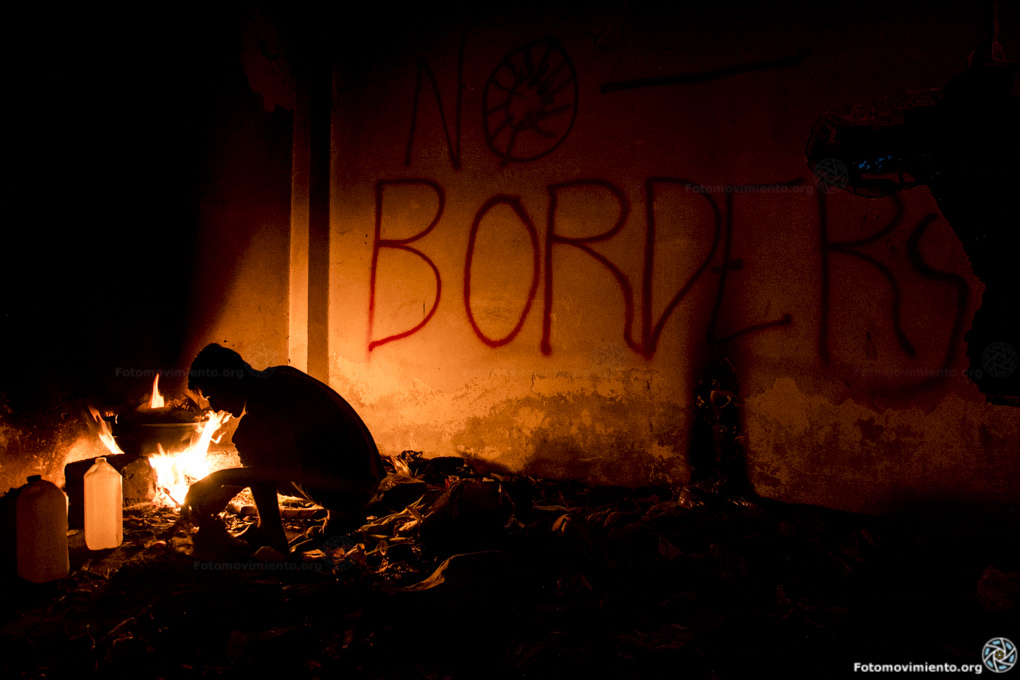I was asked to write an article in defence of no borders. This article isn’t really that, because I don’t believe it needs defending. But I would like to explain it a little. To break the myths, if you’ve heard any at all, of no borders as either an obscure brand of radical left politics, a hard-core militant group (as one friend described, ‘the ones who would steal your house while you were on vacation’), or an idea so utopian as to be virtually meaningless.
So, what follows is something like a no borders FAQ, a made-up debate, with some poetic licence, between myself and a composite of all the curious, cynical, angry, doubtful and provocative people with whom I have argued about this kind of politics in recent years. I write this with a certain amount of irony too. I am, after all, spelling out a politics that by its very nature escapes and exceeds any definition. This is also my very personal take on the politics of a struggle I have been involved with for many years. I don’t claim to speak on behalf of anyone, or any group except myself.
OK, so what is no borders?
In a nutshell, I would call it a global movement made up of many different struggles for the freedom of movement that express the demand for the end to all borders.
But that’s just totally unrealistic
Yeah, I mean, when you just lay it out as a straight up political discourse or demand, it’s hard to swallow. But no borders isn’t primarily about engaging in political debate. It is, first and foremost, a practical struggle. And on this level, it’s really happening.
Oh yeah. How?
Look at the struggles in places like Eidomeni, Lesvos and Ventimiglia that took place during the ‘European migration crisis’. There are the people who continue to cross from Morocco into Spain, or from Libya – now Tunisia – into Italy. I would say these are all examples of when people denied the freedom of movement took direct action collectively, either very visibly, like through protest, or invisibly, through strategies that enabled them to cross borders without being caught.
Yeah but those are all examples of where states exercised massive power to control mobility.
On one level yes. The huge bottlenecks of people in Calais, Eidomeni, Lesvos and Ventimiglia are an effect of the European migration control regime. But these struggles are far from just the story of control.
Take the Calais Jungle. This was a crucial node in a vast network of and for people moving without permission. And remember it was only one example in a more than twenty year history of people making places to live in while they’ve tried – mostly with success – to cross from Calais to the UK. Because of this, it became a major problem for the authorities. It was not just a passive place from which the authorities were able to gain a hold over peoples’ free movement. It was also an active space outside of the system.
The destruction of the Jungle forced people to change their strategies, but it did not succeed in controlling migration. People moved to other parts of north-western Europe to try and cross. People who had been dispersed across France stayed in contact with each other and continued to share information on future possible tactics. Even after all that there’s still an estimated 800 people in Calais trying to cross.
Actually, these are just examples of the things that make the news. Most of the struggle goes on under the radar of public or state attention. I mean the WhatsApp networks, the knowledge shared, the safe houses, the friendship and filial networks, all the small, often mundane ways that people carve out autonomous moments or spaces.

But none of those things are changing public or political opinion. Given the state of most immigration debates in Europe (the threat from the far right, the crisis of European identity as embodied by Britain’s exit from the EU) isn’t it much more pragmatic to argue for open borders or fairer immigration controls?
Well pragmatism has got us into hot water many times, and many things have been done in the name of pragmatism that were quite radical. I mean, was it pragmatic to bomb Iraq? Is the response to the global economic crisis of many states pragmatic? Is reform always pragmatic? On the other hand, I would argue that accepting that mobility happens is really pragmatic. Anyway, like I said before, no borders isn’t so much about influencing public debate as living a different world.
OK so would you say the difference between open borders and no borders is a matter of influencing public debate?
In many ways, yes. I would say that open borders is firstly a social movement that aims at (radically) reforming the current immigration system, such as working towards a legal or constitutional right to migrate, or to a fairer and more open Schengen system, whereas no borders is firstly a practical movement of people taking direct action for free mobility, where the demand for no borders is implied in the action of people attempting to move as if borders didn’t exist.
From that perspective, the most numerous and active no borders activists are the very people who move without permission. As a social movement, this struggle also articulates the right to free movement, but it also asserts that this isn’t compatible with a global system of states, ‘No borders! No nations!’ being a common slogan. In that sense, no borders is about creating a totally new system, rather than reforming the existing system.
But how can you claim that people who move without permission are no borders activists when most of them want exactly the things that you’re claiming are the problem: rights, jobs, participation in ‘the system’?
Yeah, no borders is shot through with dilemmas. It’s not a position with all the issues neatly tied up in bows. It’s messy, and seeks to engage with that messy reality. But, you can say that in the moment of struggle, in that outsider space or whatever you want to call it, you are sharing something important, and you are, in that moment, together with a common aim.
And beyond that, no borders isn’t just about people who move without permission reclaiming their free movement. It’s also about what people – regardless of whether they have papers or not – create together. It’s about all the ways of being that constitute an entire, largely ignored history of collective action; of power-with, rather than power-over. All the squats, land occupations and pirate utopias. In that sense it’s got little to do with state borders at all, but is about undermining borders in the broadest sense.

But states exist. How do you propose we create a world without them?
Yeah, but they’re also hugely over-rated. There are loads of ways that people live their lives without the state, or as if it didn’t exist. For example, all the different ways that people form tribes, whether these be face-to-face communities or imagined ones. Then there are big examples like the Zapatista autonomous region in Mexico. Or the micro examples like all of the relationships we build that are non-hierarchical, like relationships of care.
Doesn’t no borders just play into the hands of the far right by implying some kind of dystopian future of one homogeneous global state, a kind of globalisation on steroids, where community is over?
I’d say no. From my perspective, it’s more about undermining existing inequalities by everybody having the ability to move or to stay where they want. That isn’t the same as saying that place and belonging don’t matter. One of the biggest problems I think we face is how our connections to places and people are being undermined. We need to create places where the people in those places matter, whether they have been there all their lives or just arrived.
No borders isn’t about bringing on a permanently mobile population that’s disconnected from places, people and traditions, but about creating a world where people have value and their contribution is valued. That is compatible with a world where people can come, go and stay freely, where they can invest in the places they are in, feel valued and impart value. This isn’t a static vision that says that our cultures are fixed and we must keep out outside influence, but a dynamic one that accepts that change – and movement – happens.
If we really had a system of true free movement, wouldn’t it just undermine the welfare and economic systems we have in the west?
Well yeah! There’s plenty of reason to argue that those welfare systems we seek to protect, the wealth we seek to protect, was stolen through centuries of legitimised theft and violence through systems of colonialism and racism in the first place anyway. So at what level is it ours to protect? There are people who say that freedom of movement wouldn’t undermine standards of living in the west. I would say, lets get real! No borders is a radical stance that demands and hopes for radical change. I don’t think it makes sense to then pacify or sugar-coat that demand by saying that we wouldn’t feel or even notice the change. Change might well be gentle and slow. But it would also hopefully be dramatic.
* Natasha King is the author of No Borders: The Politics of Immigration Control and Resistance.
** Lead image, Fotomovimiento. Flickr/Bru Aguilo. Some rights reserved
![Political Critique [DISCONTINUED]](https://politicalcritique.org/wp-content/uploads/2015/09/Political-Critique-LOGO.png)
![Political Critique [DISCONTINUED]](https://politicalcritique.org/wp-content/uploads/2015/09/Political-Critique-LOGO-2.png)
“If we really had a system of true free movement, wouldn’t
it just undermine the welfare and economic systems we have in the west?Well
yeah! There’s plenty of reason to argue that those welfare systems we
seek to protect, the wealth we seek to protect, was stolen through
centuries of legitimised theft and violence through systems of
colonialism and racism in the first place anyway. So at what level is it
ours to protect?” This is the dumbest thing I’ve ever read.
But it would also hopefully be dramatic.
This sentence alone shows the utter depravity of leftists thought. Who cares about human suffering as long as the sufferers are white and Christian? Let alone the poor of the third world to move in hopefully they will become the new proletariat and get us,the left, into power so that we will be able to Feast on caviar and champagne.